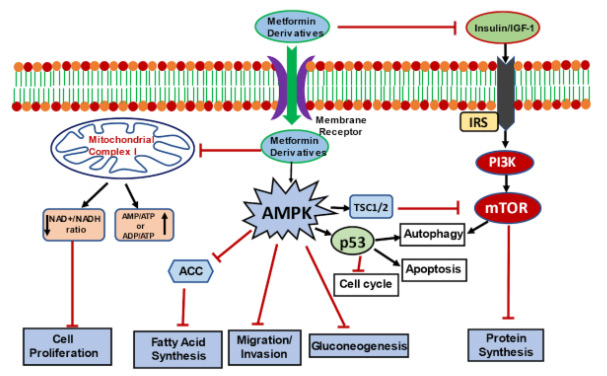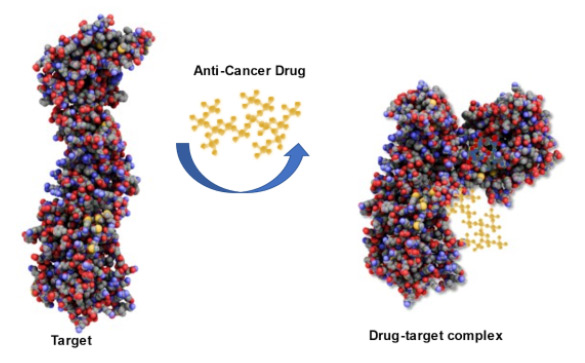A New Paradigm for Antitumor Therapy
Additional research involves the investigation of newly designed metformin-based small molecules for solid tumors including aggressive forms of glioblastoma, lung, pancreatic, and colon cancer. Molecular signatures of newly designed analogs are shown in Fig 1 and its mechanistic interaction with gene/protein is shown in Figures 2 and 3.
Figure 1. Molecular Signature of Metformin Derivatives
Metformin is a well-known anti-diabetic drug that possesses anti-tumor properties as well. AMPK is a highly conserved regulator of the cellular response to the presence of low energy in all eukaryotic cells. It is considered a key sensor of the balance of cellular ATP and AMP concentrations. Serine/threonine kinase (SKT) is an evolutionarily well-conserved kinase, activating AMPK in vitro and is genetically required for AMPK activation. Because of this compelling connection to AMPK, SKT may act as a predominant regulator of metabolism in vivo. Once activated, AMP kinase phosphorylates the transcriptional activator TorC2, thereby blocking its nuclear translocation and inhibiting the expression of genes involved in gluconeogenesis. A magnitude of AMPK activation by SKT is the inhibition of the mammalian target of the mTOR pathway. Metformin has displayed potential anti-cancer effects in various cancer cells and animal tumor models, such as lung, pancreatic, colon, ovarian, breast, prostate, renal, melanoma, and even in acute lymphoblastic leukemia. Studies have exhibited that Metformin exerts its anti-cancer effects mainly through the AMPK signaling pathway, thereby causing apoptosis in cancerous cells.
Figure 2. Metformin derivatives inhibit cancer cell proliferation, migration/invasion, and induce apoptosis via direct activation of AMPK and indirect through inhibition of mitochondrial complex I but with excellent potency than parent molecule metformin
Another possible mechanism is an amelioration of endogenous mitochondrial complex I by use of metformin therapy. Insulin stimulates cellular proliferation, and multiple signaling pathways are activated after insulin receptors or insulin-like growth factor (IGF-I) receptors interact with their ligands. Most cancer cells express insulin and IGF-I receptors. Metformin therapy decreases the levels of circulating insulin-like growth factors and insulin which, in turn, may diminish the risk of tumorigeneses. Other possible mechanisms causing the potential anti-tumor effect of metformin could be the involvement of Interleukin-6, plasminogen activator inhibitor- 1, tumor necrosis factor-α are produced by adipose tissue and can augment cancer cell proliferation, p-53 activation, downregulation of cyclin D1, and killing of cancer stem cells. We have been working using our newly designed metformin-based smart molecules (Figure 1) to identify a potential anti-cancer therapy to block the progression of tumor proliferation to improve the lives of patients with cancer.
Figure 3. Schematic of anti-cancer drug binding and inhibiting function of gene/protein
A new understanding of disease.
Our mission is to develop & deliver oncology, cardiovascular, and other therapies for patients with high unmet medical needs.



